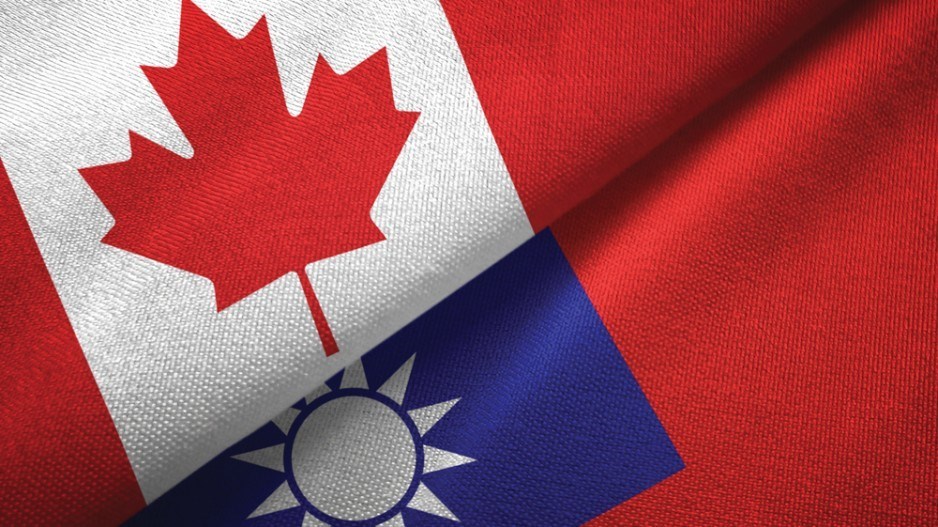Without advanced semiconductors, there is no artificial intelligence. And, there is no AI without Taiwan because it produces 90 per cent of the global supply. Competition for advanced chips is fierce with demand last month hitting an “all-time” monthly high for the 10th month in a row.
Canada needs a rapid and robust reset of its relationship to Taiwan if our researchers, companies and economy are to build on existing AI strengths in packaging, photonics, power semiconductor devices, data communications, materials, academic research and integrated circuit (IC) design.
Improving trade ties will also be essential for the success of Canada’s nascent electric-vehicle industry—even if it means risk—since 60 per cent of chips are produced in Taiwan. China has already retaliated to Canadian tariffs on Chinese-made EVs, steel and aluminum by launching an anti-dumping probe into Canadian canola exports.
The road block to more trade with Taiwan is geopolitics.
China regards Taiwan as a breakaway territory. Invasion threats are backed by almost daily incursions by military aircraft into Taiwanese airspace and an estimated one million cyber-attacks daily. That’s in addition to China’s ongoing disinformation campaign.
Despite that, Taiwanese voters chose President Lai Ching-te and his party in the January election that was widely regarded as a referendum on the island state’s relationship with China. Lai is an outspoken defender of democracy and Taiwanese independence.
Half a century ago, Canada pioneered the one-China policy that recognizes the legitimacy of the People’s Republic of China and blocks Taiwan’s participation in many global institutions, including the United Nations. The policy was subsequently taken up by all but a handful of tiny countries that you’ve mostly never heard of.
Canada’s loyalty coupled with an anxious and ardent economic courtship has yielded limited results. China is now our second-largest trade partner. Yet, bilateral trade last year was slightly less than $120 billion and less than six per cent of total trade. The U.S. accounts for 78 per cent of all trade.
Over the past five decades, Taiwan has transformed itself from a right-wing dictatorship to a vibrant democracy and—thanks to technology—grown into the world’s 14th-largest economy. Yet, Canada’s trade with Taiwan is a measly $12 billion.
Canada has taken several baby steps forward. In late 2023, it signed a Foreign Investment, Promotion and Protection Agreement outlining the bilateral trade rules and has recently increased staff in its Taipei trade office.
In April, Canada also reached a Science, Technology and Innovation Arrangement to “enable opportunities for business-led co-innovation partnerships.”
Both of those were presaged in the 2022 Indo-Pacific Strategy that recommended working toward closer ties with Taiwan on trade, technology, health, Indigenous relations, democratic governance and countering disinformation.
Meantime, German and American companies have reached multibillion-dollar agreements with the Taiwan Semiconductor Manufacturing Company.
“Canada is very timid,” said Harry Ho-Jen Tseng, Taiwan’s unofficial ambassador to Canada, when I spoke to him this month. “There are some hurdles that Canada still needs to cross. So far, it’s not been a whole-hearted approach to engage with Taiwan.”
Canada has not, for example, used its position as this year’s commission chair of the Comprehensive and Progressive Agreement for Trans-Pacific Partnership to speak about Taiwan’s pending application.
Canada has also done little about the pledge in its own Indo-Pacific Strategy to help bolster Taiwan’s democracy. Vocal in the past in defending Hong Kong’s democracy advocates, Canada made no official comment in June when China updated its judicial guidelines to include the death penalty for “particularly serious” cases involving “diehard” advocates of Taiwanese independence.
Earlier this month, Canada was also silent when China sentenced Taiwanese political activist Yang Chih-yuan to nine years in jail for “separatism.”
As long as Canada remains concerned that closer ties with Taiwan “won’t make China happy,” Tseng doesn’t expect any bold moves because China is never going to be happy.
Daphne Bramham is a Vancouver-based journalist and former columnist.




